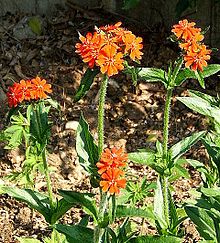- Lychnis chalcedonica
-
Lychnis chalcedonica 
Scientific classification Kingdom: Plantae (unranked): Angiosperms (unranked): Eudicots (unranked): Core eudicots Order: Caryophyllales Family: Caryophyllaceae Genus: Lychnis Species: L. chalcedonica Binomial name Lychnis chalcedonica
L.Lychnis chalcedonica (Burning Love, Dusky Salmon, Flower of Bristol,[1] Jerusalem Cross, Maltese Cross, Nonesuch; syn. Silene chalcedonica) is a flowering plant in the family Caryophyllaceae, native from central and eastern European Russia east to Kazakhstan, Mongolia and northwestern China.
It is a herbaceous perennial plant growing to 35-100 cm tall with unbranched stems. The leaves are produced in opposite pairs, simple broad lanceolate, 2-12 cm long and 1-5 cm broad. The flowers are produced in clusters of 10-50 together; each flower is bright red, 1-3 cm diameter, with a deeply five-lobed corolla, with each lobe further split into two smaller lobes, which creates a general shape similar to the Maltese Cross to which it owes its name. The fruit is a dry capsule containing numerous seeds.
It was voted the county flower of Bristol in a 2002 following a poll by the wild flora conservation charity Plantlife.
Cultivation and uses
Lychnis chalcedonica is a popular ornamental plant in gardens. Numerous cultivars have been selected, varying in flower colour from bright red to orange-red, pink or white. It grows best in partial to full sun and in any good well-drained soil, if provided with a constant moisture supply. The flowering period is extended if faded flowers are removed. It is short-lived in poorly drained soil. Double flowered cultivars are propagated by division.
The species can become naturalised or even invasive if plants are allowed to set seed; it is naturalised in some parts of North America. Thomas Jefferson is known to have sowed this plant at Monticello in 1807.
Gallery
References
Categories:- Caryophyllaceae
- Flora of China
- Flora of Kazakhstan
- Flora of Mongolia
- Flora of Russia
Wikimedia Foundation. 2010.


